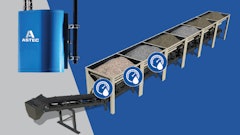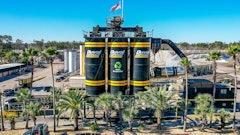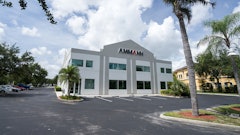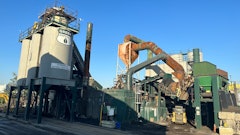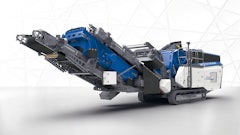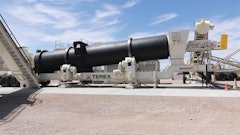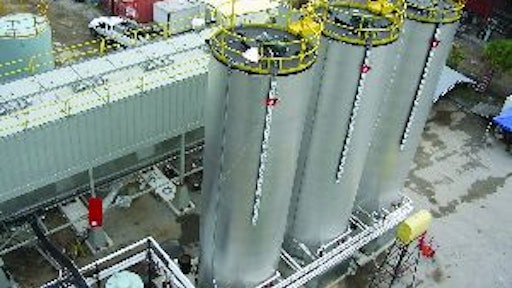
After completing a major highway project in Central Florida in 1999, Ajax Paving Industries decided to move the portable 1984 Cedarapids 160-tph Standard Havens Low Rider to the South Ft. Meyers area (San Carlos Park) to test the market. The plant was never shut off, according to Robert Ray, asphalt plant manager for Ajax?s Florida Division.
?It?s been a very good plant for us and we would run from 6 a.m. to 6 p.m. five days and sometime six days a week, but I found it very hard to schedule maintenance as the plant never stopped,? Ray states. ?In Florida, you just don?t shut down a plant. The weather allows us to work on projects year-round.?
During 2006, Ajax was planning to submit a joint venture bid on a major 30-mile widening and resurfacing project. When Anderson Columbia and Ajax were eventually awarded the design/build Interstate 75 project, located between Naples and Ft. Meyers, the approximately 500,000 tons of hot mix required to build the project proved to be all the impetus needed for the asphalt producer/contractor to upgrade its production capabilities.
Because of the lane closure restrictions and tonnage required to keep the I-75 project on schedule, Ray and Vince L. Hafeli, vice president of plants and manufacturing, began searching for a more substantial plant to replace the portable Standard Havens.
?We began to evaluate the type of plant we wanted to replace the Low Rider,? Ray says. ?The one thing we knew going in was that Meeker Equipment would be the manufacturer chosen for the liquid asphalt storage tanks and metering system, as well as the offload and feed system for our #5 waste oil.?
Meeker and Ajax previously designed a special 30,000-gallon AC tank for projects requiring rubber blends of up to 12 percent, and blends of up to 12 percent and also polymer modified asphalts. The tank design uses a non-fin coil heating system that can be removed for cleaning (by sliding the coil through a manhole at the bottom of the tank), and the design also incorporates a high volume circulation system to keep particles (like crumb rubber) suspended in the liquid AC to prevent settling at the bottom of the tank.
?We believe we were thorough in the process of selecting the plant manufacturer (Dillman Equipment Inc.) to tie in with our Meeker system,? Ray says.
?We started talking to them (Ajax) in November 2006, and we basically guaranteed that we could build a plant that would achieve their production needs (even with the high 15 percent moisture content they have to contend with), and we were able to gain their confidence,? says Tim Bulger, national sales manager for Dillman Equipment. ?We formed a cooperative effort with Meeker and Ajax in designing and constructing a plant that would meet the production requirements at that location.?
?In the end, an asphalt plant is just a bunch of iron and wiring. There are several companies out there that produce asphalt plants that do a fine job,? notes Hafeli. ?For me, the ultimate decision was in finding a manufacturer that had the people that meshed with the Ajax of Florida culture. Dillman and Meeker were the right fit for us as they are a ?get in the trench and work it out with you? company all the way from design to operation. They listen, analyze and work with you instead of always defending their position on knowing what you need.?
Plant specifics
Components purchased with the Dillman 400-tph skid-mounted Unified counterflow drum mixer plant include:
- A seven-bin (10? x 16?) virgin cold feed system with a 36? self-contained collector conveyor, a 30? x 108? aggregate access conveyor, a 5? x 14? Deister double deck aggregate screen, and a 30? x 80? aggregate scale conveyor
- A two-bin (10? x 15?) recycle system (Series I) with a 36? self contained collector conveyor, 30? x 40? recycle access conveyor, a 5? x 10? Deister single deck recycle screen, and a 30? x 80? bicycle scale conveyor
- A 10? 6? x 60? Dillman Unified counterflow drum mixer equipped with a Hauck EcoStar ESII-175 (175 million BTUs) extended nose oil or gas burner
- A 120,000-cfm Four Module Reverse Pulse baghouse with variable frequency drive fan and ancillary equipment
- Dust handling equipment that includes a 14? x 36? primary dust auger and a 14? x 24? secondary auger
- A 12? x 36? 10? Model 123610 two-room split control module
- A WEM Total Controls blending system
- Three 30,000-gallon Meeker AC tanks, diesel and waste oil tanks, and all the piping required to supply the liquids to the plant
- Mix handling equipment consisting of three 300-ton silos, a 400-tph by 112-foot slat conveyor with remote-controlled reject gate, and a 400-tph x 32? three-way horizontal transfer conveyor
Up and running in 19 days
After selecting the plant, Ajax now faced the challenge of installing the new facility in a tight time frame. Twenty-one days were allotted to remove the old Standard Havens plant and install the new and much larger Dillman plant within the same configuration and footprint of the existing plant. To further complicate the teardown and erection, the existing plant would remain operational until noon on September 21 when the disassembly and erection was scheduled to begin. During the shutdown, Ajax furnished paving projects from another plant.
When the Low Rider was turned off at noon, three old silos and a slat conveyor were removed and three new silos were erected before day?s end. That?s how the entire project was executed. As old components were removed, new ones were immediately put in place.
?We cannot say enough as to how important it was to receive the new plant components in the proper sequencing,? Ray says. ?Dillman Equipment and Meeker did everything they said they would do and more.?
?We shipped all of our components two months prior to switching out the plants,? says Everett Harwood, a liquid and combustion sales specialist for Meeker equipment. ?We set up the new AC tanks and connected them to the old plant to make sure they were operational. That also allowed us to remove the old AC tanks to make room for the new baghouse.?
?We were able to bring in the baghouse and set that up prior to shutting down the old plant,? Bulger notes. ?We (Dillman) supplied six service people to help disassemble the old plant and erect the new plant.?
?At one point there were nearly 30 people working at the site. We cannot say enough about the people who made this project happen,? Ray adds. ?We were told by different producers around the country that the 21 days would not be feasible.?
But on October 10, just 19 days after shutting down the old plant, the new plant was fired up and began producing mix. The first quality control test looked great and after producing in excess of 105,000 tons of mix in the firs seven weeks of operation, the results still look great. The Florida Department of Transportation uses a Percent Within Limits (PWL) specification and Ajax is delivering mix from the new plant that is in excess of 100 percent pay for the I-75 project.
Along with Dillman and Meeker, Ajax was fortunate to have the assistance of Asphalt Electrical Repair, Coastal Precast, E & J Welding, Mark Spalding Services, and Sunbelt/Anthony Crain Service and Trucking.
?We?re very happy with the plant performance so far,? Ray states. ?We?ll not only be able to keep up with the demand at this location, but we now also have the capability to incorporate more RAP (reclaimed asphalt pavement) into the mixes we produce. The plant has the capability of handling mixes with 50-percent RAP. We?re currently designing mixes with up to 25-percent RAP.?
Sixty-five percent of the asphalt produced at the plant supplies Ajax crews working on state projects, with the remaining production going to independent contractors and other customers.
?With 900 tons of storage capacity, we can accommodate three to four different mix designs during the day to supply our projects and our customers? needs. And at night we can switch over to produce the 1,800 to 2,000 tons we need to supply the I-75 project,? Ray says. ?We think this plant is more than capable of handling a big project like the I-75, our other projects, our customers? needs and the future growth of our Southwest Florida market.?




